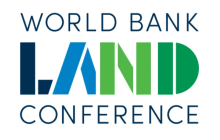Pairing ‘Climate-Smart’ Land Use Planning with Gender-Equitable and Socially Inclusive Land Rights
The session explored the intersection of climate-smart land use planning with gender-equitable and socially inclusive land rights, drawing on diverse case studies and expert insights. Presentations focused on how sustainable land management can be advanced alongside efforts to ensure equitable access to land for marginalized communities, particularly women. A case study from Liberia illustrated the integration of sustainable land use practices during community formalization, showcasing how structured planning can support both environmental goals and secure land tenure. Grassroots organizing in Bangladesh, linked to the Stand for Her Land Coalition and Landesa’s advocacy projects, highlighted how women-led initiatives can bolster climate resilience and promote women's land rights at the local level. In Southeast Asia, the session examined community-based management of mangrove ecosystems, emphasizing the dual benefits of ecological sustainability and social equity. The discussion also included perspectives from the United Nations Convention to Combat Desertification (UNCCD), illustrating how international conventions are increasingly prioritizing gender and social inclusion in their frameworks, aligning global indicators around equitable land tenure.
The moderated discussion emphasized the challenges and successes of integrating gender-sensitive and socially inclusive practices into land use planning, focusing on the benefits of grassroots mobilization and local knowledge. Participants highlighted the need for coordinated global efforts to support inclusive land rights, underlining that sustainable land management must go hand-in-hand with social justice. The session underscored the importance of aligning environmental and social objectives to foster resilience and promote equitable land governance, advocating for policies that recognize the essential role of marginalized communities in achieving climate adaptation and mitigation goals.
This resource has been made available by the organizers of the World Bank Land Conference under the following disclaimer.
This resource has been made available by the organizers of the World Bank Land Conference under the following disclaimer.


